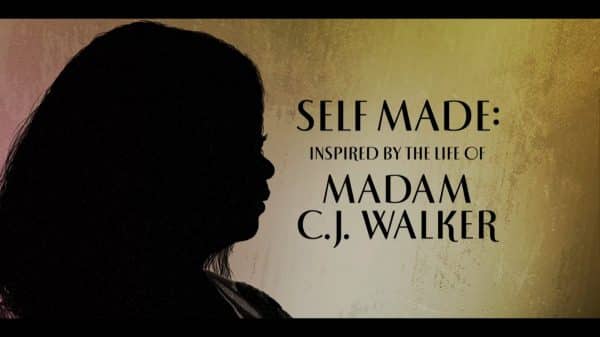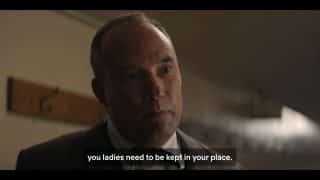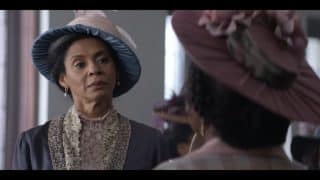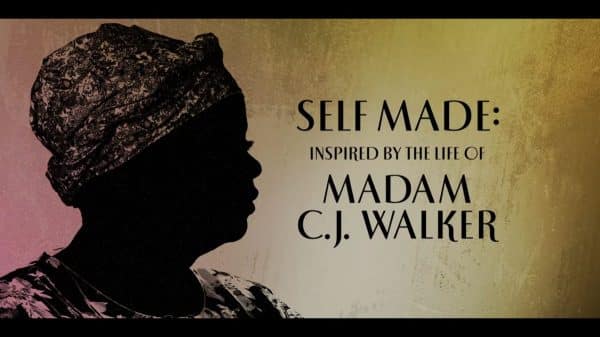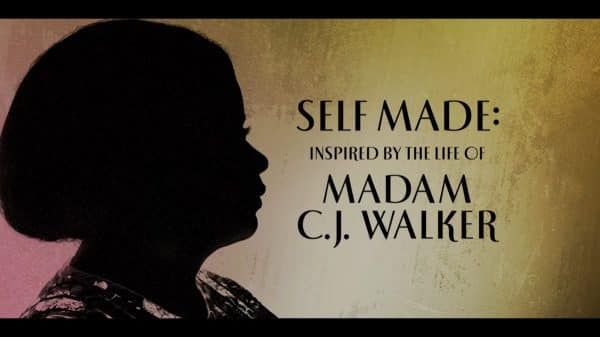Self Made: Inspired By The Life of Madam C.J. Walker – Review
“Self Made: Inspired By The Life of Madam C.J. Walker” has the performances and inspirational story you expect, but also the kind of drama which keeps this from being seen as prestigious.
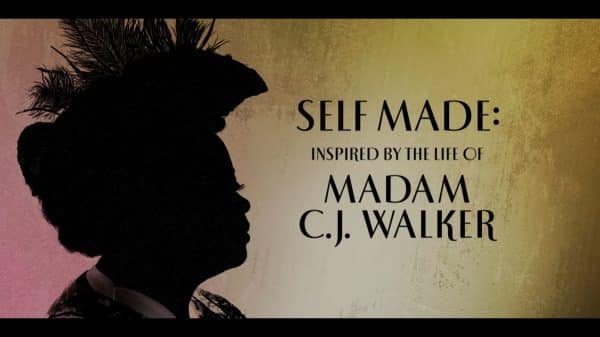
Spoiler Alert: This summary and review contains spoilers.
Additionally, some images and text may include affiliate links, meaning we may earn a commission or receive products if you make a purchase.
“Self Made: Inspired By The Life of Madam C.J. Walker” has the performances and inspirational story you expect, but also the kind of drama which keeps this from being seen as prestigious.
| Creator(s) | Nicole Asher |
| Air Date (Netflix) | 3/20/2020 |
| Genre(s) | Comedy, Drama, Romance, Biopic |
| Noted Cast | |
| Sarah Breedlove | Octavia Spencer |
| Addie Monroe | Carmen Ejogo |
| CJ | Blair Underwood |
| Lelia | Tiffany Haddish |
| John | J. Alphonse Nicholson |
| Mr. Rockefeller | Frank Moore |
| Margaret M. Washington | Kimberly Huie |
| Booker T. Washington | Roger Guenveur Smith |
| Cleophus | Garrett Morris |
| Esther | Mouna Traoré |
| Dora | Sydney Morton |
| Freeman Ransom | Kevin Carroll |
| Sweetness | Bill Bellamy |
| W.E.B. DuBois | Cornelius Smith Jr. |
Season Plot Synopsis
Throughout the season, which covers 1908 up until 1918, we watch as Sarah, an orphaned woman from the south, rises to become Madam CJ Walker. A journey which, while it has its highs in her having her own factory, often brokering her own deals, and supporting hundreds, if not thousands of Black women, is also filled with personal drama. Be it insecurities from not being a light-skinned woman with silky hair to issues with her husbands, a woman named Addie, and how, both within and outside the Black community, Madam CJ Walker likely had more adversaries than champions.
Yet, despite it all, we see her triumphant rise to being one of the top people in the beauty industry. Also, thanks to men like Freeman Ransom, and early supporters like Margaret M. Washington, we are reminded of what happens when Black folk invest in one another.
Collected Quote(s) & .Gifs
I used to wonder, if God don’t like ugly, why did he make me? With so much beauty in this world, how come I got so little?
— Sarah (Season 1, Episode 1 “The Fight of the Century”
Everything we do as Negroes reflects back on us.
— Sarah (Season 1, Episode 1 “The Fight of the Century”
Dreams are God’s way of showing us his plans.
— Sarah (Season 1, Episode 2 “Bootstraps”)
It’s my duty to make money and use it for the benefit of my neighbors.
- Sarah, quoting John Rockefeller (Season 1, Episode 3 “The Walker Girl”)
Review
Highlights
Season
Sarah Not Forgetting Why She Started Her Company – 95
By the end of the season, as Sarah finds herself discarding people, trying to build a legacy, and facing her own mortality, we see her come to a crossroad. One in which, like many self-made people before her, or those who were given the money to become big, she could have done one of two things: Abandon the people who got her there, or take a slower route, but satisfy what was essentially her foundation. In talking with Mr. Rockefeller, we saw her make the decision to honor the social contract she made with her girls and remember the whole idea was providing women like her options.
Which, in the long run, was important. For as you look into the faces of the women working for Sarah, it was more than just women who were light-skinned or dark-skinned. It was older women, taller, shorter, not really any big girls, but certainly girls who wouldn’t fit into a size two. These women mirrored the women Sarah met while in that market, and on her way up and to abandon them would be to abandon what made the company a success. So while, who knows what of this was inspired or true, one could imagine that moment truly played out and is one of the handful of things you don’t feel the need to question about this series.
Acknowledging The World Beyond Madam CJ Walker – 82
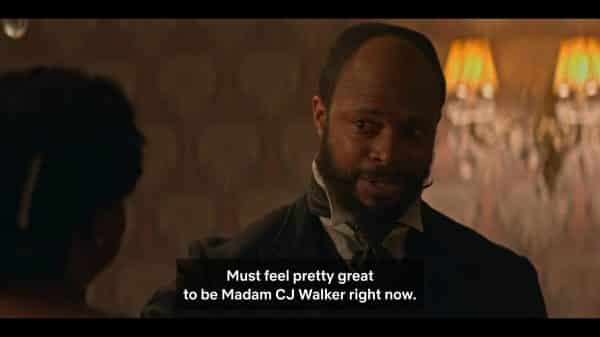
From W.E.B. DuBois’ presence, and the notation of how people like him felt about Booker T. Washington, to acknowledging that there were bigger issues in the world than what Sarah was going through, as shown through the lynching of Sweetness. Leaving you to see what Black people were going through, yet maintaining the focus, which we don’t get on this scale, of what Black women went through.
Episode 1: The Fight of the Century
The Fight Of A Dark Skin Girl With Tight Curls And Meat On Her Bones – 85
One of the things that watching “Self Made” really pushes you to recognize is the fight women who are dark-skinned don’t have silky or loose curls and aren’t trim experience. They have to fight off fellow women who think, just because society has put them on a pedestal, they can separate themselves from those they share an ethnicity with. You know, lavish in their privilege and yet also take advantage of being seen as a minority when they see fit.
And in many ways, watching Sarah’s come up helps you understand why so many have an issue with Black being seen as a monolith and characters who look like any means you would describe Sarah being in short supply. For as much as there is a need to see Black folk in all shades, hair textures, and more, there is no denying women like Sarah are rarely the stars of the story. They don’t get men like CJ, get into fights and win against women like Addie, they often are the supportive best friend or suffering.
So to see a woman go against the odds despite being an orphan, and so many other things that could have broken her, it’s an inspiration in ways that often feel untapped.
CJ Being a Supportive Husband (At First) – 84
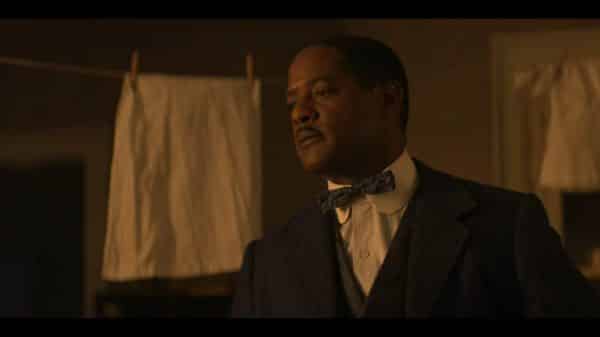
While his father does dog him out a bit for his role in Sarah’s company, there is no denying that the idea of a Black man, in the early 1900s, being so supportive of his woman isn’t awe-striking. I mean, take into consideration, both are free, southern, Christian, and yet CJ is pretty much dedicating most of his spare time to his wife’s pursuit of independence. One born out of another woman making her feel low and less than.
And while, granted, when things became dire, he gave her a time limit, but between them, there was no, “I told you so” when things got better, and no eye rolls either. He helped with advertisements, doing hair, packing products, and pretty much everything but selling directly to women.
Episode 2: Bootstraps
The Tenacity of Madam CJ Walker & Realization That Women Can Support Women – 90
It is in this episode that it appears to click in Sarah’s mind that, despite her relationship with Addie, other women aren’t solely to be used, employees, or friends at arm’s length. They can be peers, real friends, and it is all thanks to Margaret M. Washington. For, in many ways, it seems what Sarah needed was representation, validation, and the idea she wasn’t on her own.
After all, isn’t that why she says, when talking about her business and factory, “Mine?” With Addie doing her dirty, and likely the baggage her first husband left, as much as she might be married, with a child, and has a good family, she’d rather live with the decisions and take the blame for things going wrong when they are her fault. Case in point, John burning up the house or when CJ was supposed to get Booker T. Washington over for dinner. In both cases, men disappointed her and sent a bill with their wake up call.
However, in Mrs. Washington showing solidarity by not only showing up but presenting investment, I think that awoken something in both sides. For Mrs. Washington, she saw that education and the uplifting of Black men wasn’t the best a Black woman could do in the pursuit of equality. Then, for Sarah, as noted, she saw that whether light-skinned or dark, educated or learned through trial and error, there can be comradery amongst Black women. That what would once separate them falls to the side when opportunity is presented.
Now, granted, opportunity, in this case, was the chance to make money and invest in a sister. However, take note, amongst Mrs. Washington’s peers, there were no color lines. Yes, maybe lines in terms of education, but just knowing the women existed, with only old media in circulation at the time, probably required some know-how beyond the ability to read.
Episode 3: The Walker Girl
Meeting Addie’s Mom And Understanding Her Grief – 86
While her mother calling her a curse doesn’t excuse her behavior, what so ever, it does illuminate why Addie not only looks down on dark-skinned women but feels the need to be better than Sarah. In our mind, there is this need to be better than Sarah for if Addie isn’t, so comes the question of what was her mom’s excuse? Why is it her mom relies on her financially if this woman who is bigger than her mom, and probably as educated, can compete with Addie’s privilege?
And, in general, I think this episode really pushed the concept of what is light-skinned privilege as far as it can go. Because of Addie’s mom being raped, she might be seen as a curse on her mom, but the privilege is a blessing. It seemingly got her into schools, made her the object of every man’s affection, and allowed her to start a haircare business for the Eurocentric standard she represents is highly desired. And, let’s be frank, while light-skinned, she is still a Black woman, so being adjacent to privilege is better than feeling you have none at all.
Cleophus – 83
While Cleophus has been a good constant reminder of how, less than a lifetime ago, Black folk were on plantations, in this episode, it hit in ways not appreciated in episode 1 or 2. Not just in the form of being reminded how people were traded, but also how survival meant forging connections. Hence Cleophus having a sort of gossip network amongst his former peers.
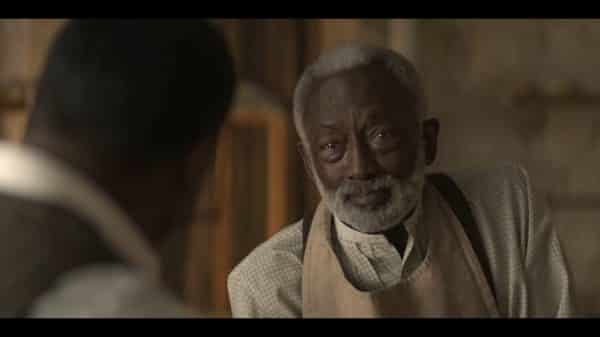
But what hit hard was when he was talking to CJ about his momma. The memories of Cleophus keeping one shirt clear to see his girl the one day he could, and the idea she ran back for him and their son and died doing so.
Now, have we forgotten that Cleophus likely planted the seed which made his son so insecure? No. However, I think, with his statement this episode, the point was to get CJ to have his own thing and not be so reliant on what clearly Sarah saw as her own. Hence him mentioning getting a hobby this episode and, to further prove he isn’t just trying to keep on the teet, he didn’t say anything about him and Sarah being good despite his son being a whore.
The Beauty of Harlem – 86
All things considered, we’re overdue for a Harlem Renaissance show. For just seeing what Harlem was, and the way Lelia acted, it really pushes to the forefront of your head what is missing in the zeitgeist of entertainment. Not to put down the many books and snippets we’ll get in upcoming biopics, but there is a need for something more definitive. Especially considering the way people talk about New York as a character within itself, so why not make it the lead?
Sarah Getting Tired of Feeling Unseen, Unloved, and Unappreciated – 87
Because of CJ, Addie, and life in general, trim light-skinned women haunt Sarah. Mind you, only during failures in her life, and she never talks about wanting to be like them. However, there comes a point when it becomes clear to her that she has to change the narrative.
Take note, she started her business as a response to people like Addie who thought less than when they looked at her and, I’d submit, putting her face on her product was about empowering others besides providing employment. After all, if there is one thing Sarah learned about advertising and images from CJ and Addie is that visuals and branding change perception. So, taking note Sarah learns as she goes and is a bit of a sponge for knowledge, she did what was called for.
Low Points
Season
The Addie Rivalry – 69
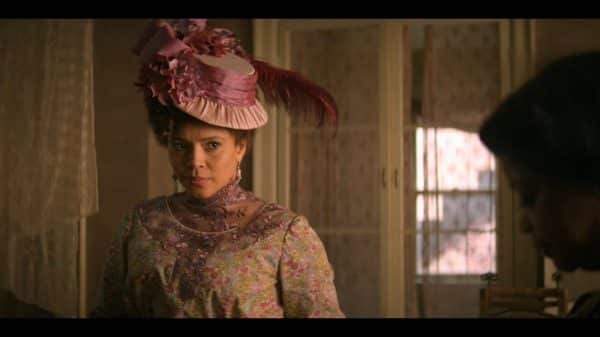
While it is very possible Sarah stole and improved on an established product, there is something about the Addie rivalry which seemed so annoyingly basic. Maybe because it was rooted in Addie not wanting a dark skin woman, who wasn’t as polished as her, doing well? Perhaps it could be her own self-hatred and maybe seeing in Sarah what she hated most in her mother. Either way, that back and forth and how their rivalry ended, it was the weakest part of this limited series, and that’s counting the roles of CJ and John.
Episode 3: The Walker Girl
The Decision To Use Modern Music – 65
It’s one thing to use rap music which fits the moment and is uplifting, however, using the “Harlem Shake” song had me shaking my head. Out of all the music that can be used to introduce Harlem on the show, you pick the song which didn’t even have the Harlem Shake dance done, right?
But, generally speaking, most of the music, even the positive rap, just seem so out of place considering the looks, the dialog, and the times.
On The Fence
Season
How Pristine Madam CJ Walker Is Written
Were we looking for dirt or something that would tarnish her legacy? No. However, in showing Sarah as an underdog who pulled herself up by her bootstraps, took on powerful men, and dealt with anything from the hatred or indifference of men who could have made life easier, a lot of her life seemed to be based on the decisions of others. Which, in many ways, makes sense for what options did Sarah have? She was poor, dark skin, at one time losing her hair, heavyset, unmarried, and a slew of other things.
But, it becomes strange to watch the series paint Sarah as either the victim or a role model and holding the character to that strict dichotomy. For surely she made mistakes, had bad habits, besides a love for pork, and was uneasy with her daughter being queer? And, again, this isn’t me saying she should have been dogged out or shown as a horrible person. If anything, I’m asking why could she not have been taken off the pedestal and made human. Assuming there is more to her than the inspiration story of the series details.
Episode 1: The Fight of the Century
The Addie v. Sarah Pettiness – 70
While there is a need to address the social hierarchy of skin tone in the south, and with us seeing someone called the N-word, it is clear we’re in a time where being PC or passive-aggressive wasn’t practiced, it is slightly aggravating to see Addie go so hard at Sarah. In fact, it makes you want to look into Sarah’s true story, since it is made clear this is inspired, for you want to know whether to side-eye the writers for how Addie acts or just be upset, over 100 years ago, you still got the same nonsense which permeates 2020.
Episode 2: Bootstraps
John, CJ, and Addie – 71
I know every story needs a villain, an obstacle, some sort of force pushing against our lead and their goal, but while I can tolerate the idea of Addie, John being a snitch and CJ with some light skin gal was a bit much. Granted, the men involved had their ego hurt either by their women clearly not needing them or, in John’s case, assuming Esther was taking his gal. However, and I know I’m looking at the early 1900 with 2020 eyes, it is just frustrating as hell to see a man like John b**** and gossip to someone like Addie and CJ, to perhaps assert his manhood, be with someone like Addie, later Dora, possibly to get back at his wife.
Here is to both of them getting divorced and hopefully ending up destitute.
Miss Esther’s Blues – 75

I don’t know what the story will be between Ms. Ether and Lelia, but I can’t be the only one getting “The Color Purple” vibes, right? And the only reason this is an, “On The Fence” subject” is because I don’t know where they are going to take this. Will it explore Black lesbianism in the early 1900s, a story within itself, or will this just be something to keep Haddish busy as she pushes to show she can do more than tell a joke? Which, by the way, she isn’t too bad thus far. Mind you, still in the realm of what you expect, but definitely starting to tap into that darkness she often makes light of in her set.
Overall
Rating: Positive (Watch This)
Throughout the season, there is a need to remind oneself this is “Inspired” by the life of Madam C.J. Walker. Especially as storylines play out that seem clearly made to create drama, friction, rivalries, more than illuminate us on one of the most recognizable names in the world. And while we’re all for obstacles and challenges, considering how Addie was written, the way John and CJ were, there came a point of questioning how far were liberties taken to up Sarah and make these people not only look like fools but become hated?
Yet, despite feeling some of these characters were performed far better than they were written, it is hard to not still enjoy the fact this was made. That we got to see a woman who is darker than a paper bag, without much education and wasn’t considered the look of high class move up in society and do it all on her own. She didn’t rely on nothing but her husband’s catchy name, hired hundreds, if not thousands, and by the way the series puts it, recognized in Freeman Ransom she needed someone to handle what she couldn’t learn on her own, but everything else she took on by hitting the ground running.
Hence the positive rating. “Self Made: Inspired by the Life of Madam C.J. Walker” may have taken questionable liberties in telling the story, but the performances make it so, while storyline choices might be strange, the pride is nevertheless strong. And truly, I so dearly hope, after this, we don’t have to hear about Octavia Spencer needing a co-worker or producer fighting for her to get the pay she deserves. For, even if they are getting her roles like this, it seems she needs to fire her agent.
[adinserter name=”Follow Us”]
TV Shows We’re Covering This Season
Images used for editorial and commentary purposes. All rights remain with their respective copyright holders.

